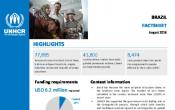Brazil
Operation: Brazil
Location
{"longitude":-51,"latitude":-12,"zoom_level":4}
Latest update of camps and office locations 21 Nov 2016. By clicking on the icons on the map, additional information is displayed.
Key Figures
| 2018 planning figures | |
| 100% | of children of concern will have access to national child protection and social services |
| 100% | of increase in resettlement places offered by Brazil |
| 100% | of advocacy interventions for access to national legal services will be carried out |
| 90% | of people of concern will have access to formal work opportunities |
| 80% | of status determination procedures will meet UNHCR’s minimum procedural standards |
| 2016 end-year results | |
| 848 | vulnerable families received financial assistance |
| 100 | children were engaged in Music Choir Project and 100 children were supported with complementary multidisciplinary education programme, with the aim to promote integration and raise awareness on protection needs of refugee children |
| 33 | refugee women were empowered through a UN Global Compact initiative which organized coaching sessions and workshops, set up an engagements coalition and sensitized over 120 private companies on refugee issues |
| 18 | people of concern were supported through a Creatathon with Google, in which refugees and local entrepreneurs come together to develop solutions to refugees’ needs |
Latest Updates
People of Concern
90%
Increase in
2016
2016
| 2016 | 68,087 |
| 2015 | 35,790 |
| 2014 | 47,946 |

[["Refugees",9689],["Asylum-seekers",35464],["Stateless",4],["Others of concern",22930]]
Loading ...
Brazil
< Back
2016
{"categories":[2013,2014,2015,2016,2017,2018],"budget":[5.12118575,8.19637972,7.098857403,6.23346253,5.76667646,6.120936021],"expenditure":[2.63326259,2.73418992,2.83442588,2.7706671,null,null]}
{"categories":[2013,2014,2015,2016,2017,2018],"p1":[4.91231784,8.08073631,6.913140803,5.99089301,5.57680196,6.017069501],"p2":[0.20886791,0.11564341,0.1857166,0.24256952,0.1898745,0.10386652],"p3":[null,null,null,null,null,null],"p4":[null,null,null,null,null,null]}
{"categories":[2013,2014,2015,2016,2017,2018],"p1":[2.52868194,2.69922657,2.76896319,2.65545223,null,null],"p2":[0.10458065,0.03496335,0.06546269,0.11521487,null,null],"p3":[null,null,null,null,null,null],"p4":[null,null,null,null,null,null]}
Loading ...
CHOOSE A YEAR
- 2015
- 2016
- 2017
- 2018
Year-end Overview
Plan Overview
Working environment
UNHCR works in a favourable environment, although under a challenging political context. Recent turmoil in Brail’s political scenario have brought uncertainty in the level of the Government’s engagement in refugee issues.
Brazil currently hosts close to 9,000 refugees. Asylum claims in Brazil will continue to increase in 2018, due to the deteriorating situation in Venezuela.
At the 2016 Leaders’ Summit on Refugees, Brazil committed to admit 1,500 people affected by the crisis in Syria by combining their humanitarian visa programmes with private sponsorship programmes, including for UNHCR-referred refugees. In addition, Brazil has pledged to establish a state-funded resettlement programme for people from the North of Central America (NCA) by the end of 2018. Uruguay has also committed to receive families from the NCA.
The population of concern has access to basic public services, such as health, education, housing and poverty relief. However, the persistent economic crisis remains a challenge for the promotion of livelihoods and self-reliance.
UNHCR works with the Government’s on judiciary and legislative issues, and implements activities with civil society organizations and other UN agencies. In addition, UNHCR has reinforced its partnership with universities to provide legal services, language courses and assistance with diploma validation. UNHCR also advocates for the implementation of the 2030 Agenda for Sustainable Development to include people of concern in national programmes.
Key priorities
In 2018, UNHCR will focus on:
- Reinforcing and fostering cross-border monitoring and protection networks; developing reception, referral and response capacities, and emergency preparedness with national and local stakeholders.
- Supporting federal authorities on capacity building, registration system, physical verification and case management system towards developing quality asylum systems and promoting high protection standards.
- Promoting local integration policies and livelihoods opportunities to ensure self-reliance of people of concern.
- Advocating for the establishment of a statelessness determination procedure, alongside with facilitated naturalization solutions for stateless people.




